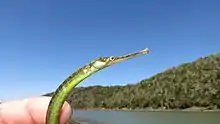| Longsnout pipefish | |
|---|---|
 | |
| Scientific classification | |
| Domain: | Eukaryota |
| Kingdom: | Animalia |
| Phylum: | Chordata |
| Class: | Actinopterygii |
| Order: | Syngnathiformes |
| Family: | Syngnathidae |
| Genus: | Syngnathus |
| Species: | S. temminckii |
| Binomial name | |
| Syngnathus temminckii Kaup, 1856 | |
| Synonyms | |
Syngnathus temminckii (longsnout pipefish) is the most common pipefish in southern African estuaries, ranging from Walvis Bay (Namibia) to the Tugela River on the east coast of South Africa.[1]
The fish is named in honor of Coenraad Jacob Temminck (1778-1858), the director of the Rijksmuseum van Natuurlijke Historie (Leiden, Netherlands), where the type specimens are housed. [2]
Biology
This species is common in estuaries, usually in eelgrass beds, but has also been found offshore to depths of 110 m.[1] Sexual maturity is reached at 12 cm, and breeding occurs from March to November. Males carry the developing embryos in a brood pouch on their belly.[1]
Taxonomy
Syngnathus temminckii was until 2013 synonymised with the European species S. acus (greater pipefish), but morphological data show that it is distinct.[3] Genetic data further indicate that it is not even the sister taxon of S. acus, but of another southern African species, the critically endangered estuarine pipefish, S. watermeyeri.[3]
See also
- Long-snouted pipefish, Stigmatopora macropterygia A. H. A. Duméril 1870.
- Longsnout pipefish, Leptonotus norae Waite 1910.
References
- 1 2 3 Heemstra, P.C. (2004) Coastal Fishes of Southern Africa. NISC (PTY) LTD
- ↑ Christopher Scharpf & Kenneth J. Lazara (22 September 2018). "Order SYNGNATHIFORMES: Families AULOSTOMIDAE, CENTRISCIDAE, FISTULARIIDAE, SOLENOSTOMIDAE and SYNGNATHIDAE". The ETYFish Project Fish Name Etymology Database. Christopher Scharpf and Kenneth J. Lazara. Retrieved 9 December 2021.
- 1 2 Mwale, M., Kaiser, H., Barker, N.P., Wilson, A.B. & Teske, P.R. (2013) Identification of a uniquely southern African clade of coastal pipefishes Syngnathus spp.. Journal of Fish Biology 82: 2045-2062
